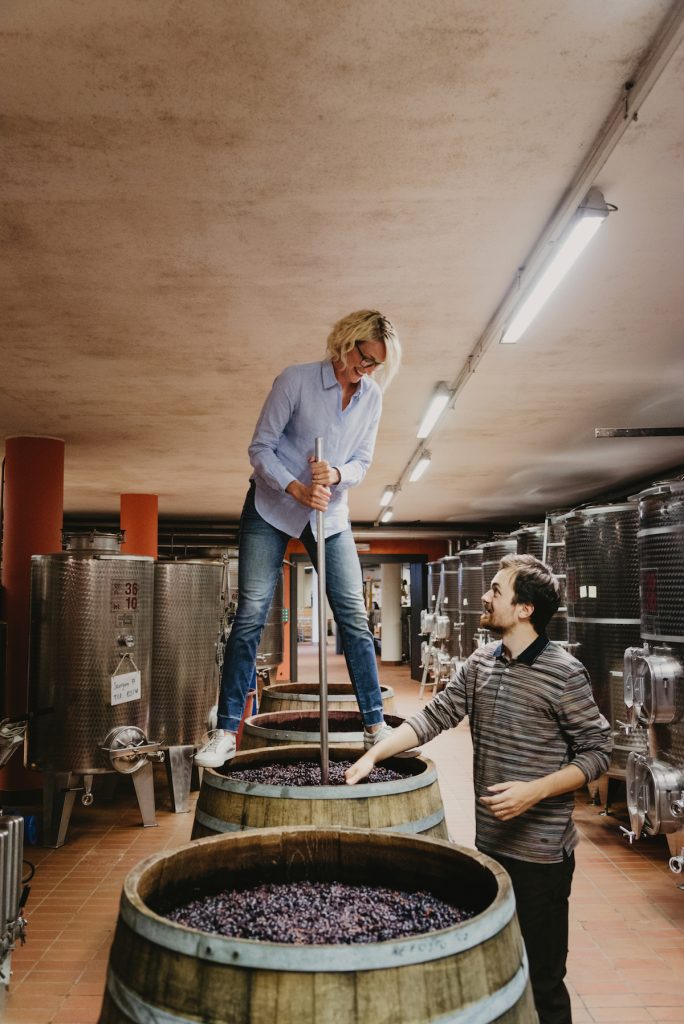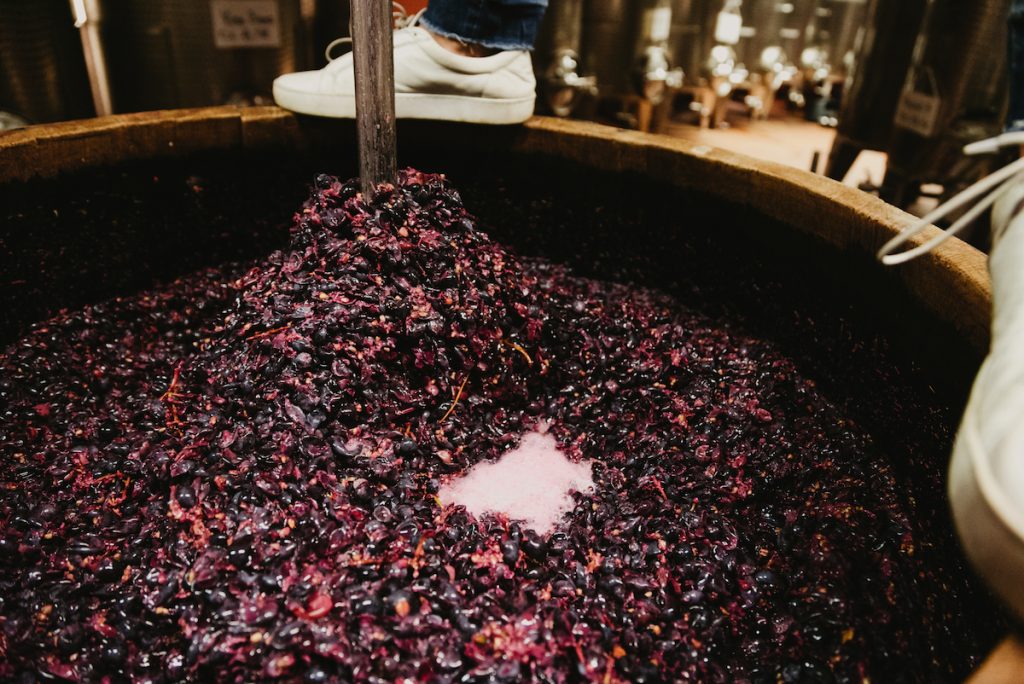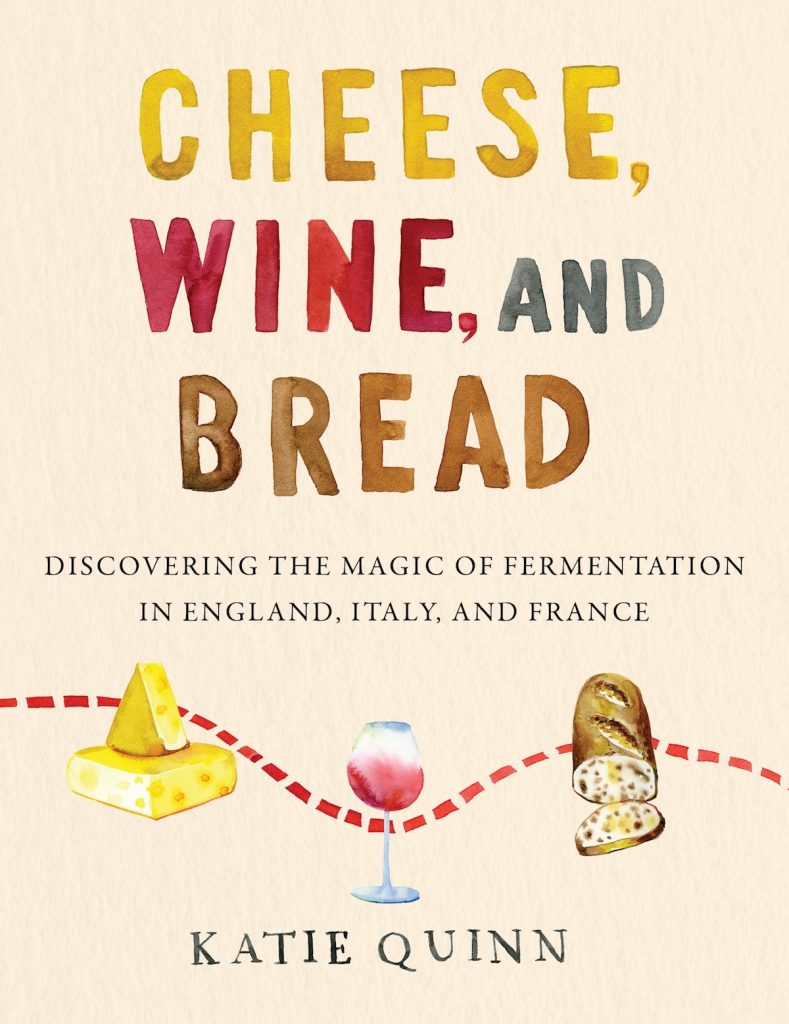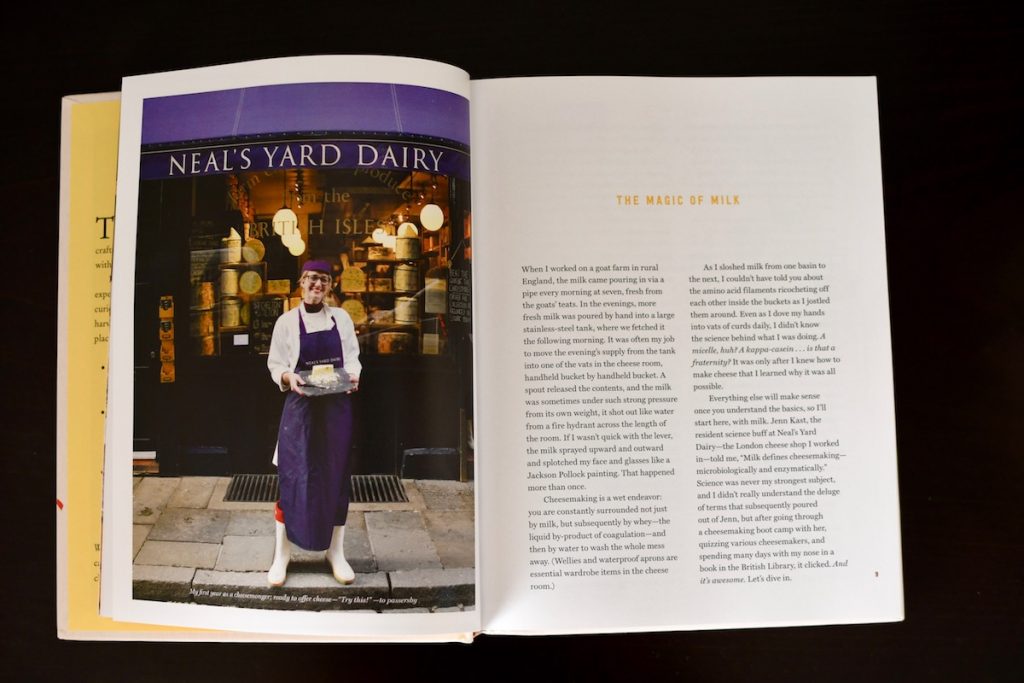Chat with an Expat: Meet Katie Quinn
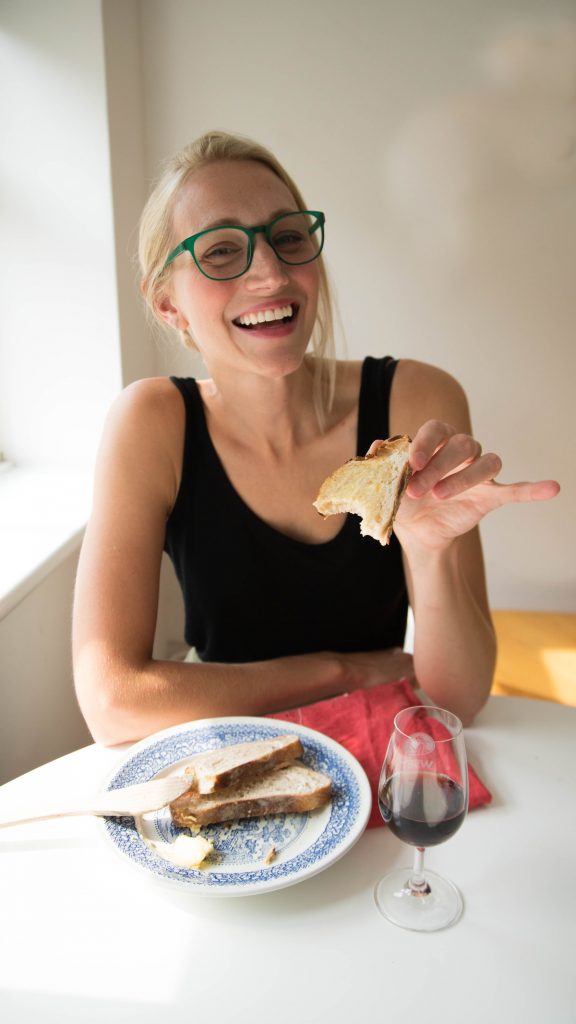
Katie Quinn is a YouTuber, podcaster, journalist and author who has since last November, lived with her husband Connor in Trani, Puglia. Katie has covered a lot of ground in pursuit of knowledge to remedy what she thought was food expert imposter syndrome. So, in under four years, she went from dipping her toe to being fully immersed in everything cheese, wine and bread. These experiences (and hundreds of sticky notes) turned into organized thoughts expressed and displayed beautifully in her new book, “Cheese, Wine and Bread: Discovering the Magic of Fermentation in England, Italy and France”. Enjoy reading (and watching) Katie’s journey and adopt two of her survival strategies. First, keep it quirky and second, let it ferment.
Stay-tuned for the video interview! Subscribe to Live in Italy Magazine on YouTube for updates.
Where were your born and grow up?
I’m an Ohioan, through and through, born and raised in southeast Ohio in a little town called Athens. I went to school and went to Miami University of Ohio then moved to New York. That was when I kind of went: “Oh there’s a world outside of Ohio. That was a big first for me.”
I studied Mass Communications with a Theatre minor. I never was one of those people who always wanted to go to New York, but got a job opportunity there. Of course, I then fell in love with it and the food scene completely grabbed my heart. I ended up there for a decade.
You worked in Broadcast Journalism and a startup before I went freelance. I’ve never turned back after going freelance and that was about seven years ago.
When did you meet your husband, Connor?
I do talk about this in the book. I met Connor in New York City and we had worked together. Then, we ended up getting together down the line. We moved to Europe because he had a job opportunity in London and that’s what got us across the pond and a little closer to Italy. Then, he and I moved to Italy last November. So we’ve been here 6 months now which is really crazy!
On November 1st, we flew from London to Rome and then got a rental car and drove to Puglia.
When did the idea of becoming an Italian citizen come about?
The seed was first planted when I lived in Paris five years ago. I was just there for three months attending Le Cordon Bleu culinary school. A friend of mine in Paris let me know that I was eligible to become an Italian citizen because of my grandparents. I put it in the back of my head, but later started to do a bit more research. I was eligible because both of my great grandparents were born in Italy and in particular my grandfather.
When I started researching for the Cheese, Wine and Bread book I separated these topics by country because I wanted to do immersive experiences in each product. I was a cheesemonger in England; traveled all around Italy researching wine and working in vineyards; and then France for bread. While I was in Italy interviewing winemakers and traveling really from north to south and in Puglia just across from Basilicata, I realized that my great grandfather was from this small town called Tursi. It was only a two hour drive from where I was and figured that I should go there before the next vineyard visit. I went to the commune and asked if I could see his birth certificate.
Wine
It was quite an experience because I did not have the right information and the dates that I had were wrong. This experience goes so hand in hand with everything that I write about because wine in Italy and its history is incredible! Wine in general and historically has been about family. It’s all about heritage and native grapes.
(11:03) Listen to Katie and I go on a wine geek tangent. How many indigenous grapes are there?
Cheese, Wine and Bread: Katie’s New Book
At this point, I wasn’t really sure if I’d move to Italy and then COVID hit and Connor’s job shut down in London and then our visas to live there evaporated overnight. We then had to decide where we would go. Realizing that I had all of the documents for Italian citizenship, it was then that we booked the flight to Italy.
Working as a Cheesemonger in England
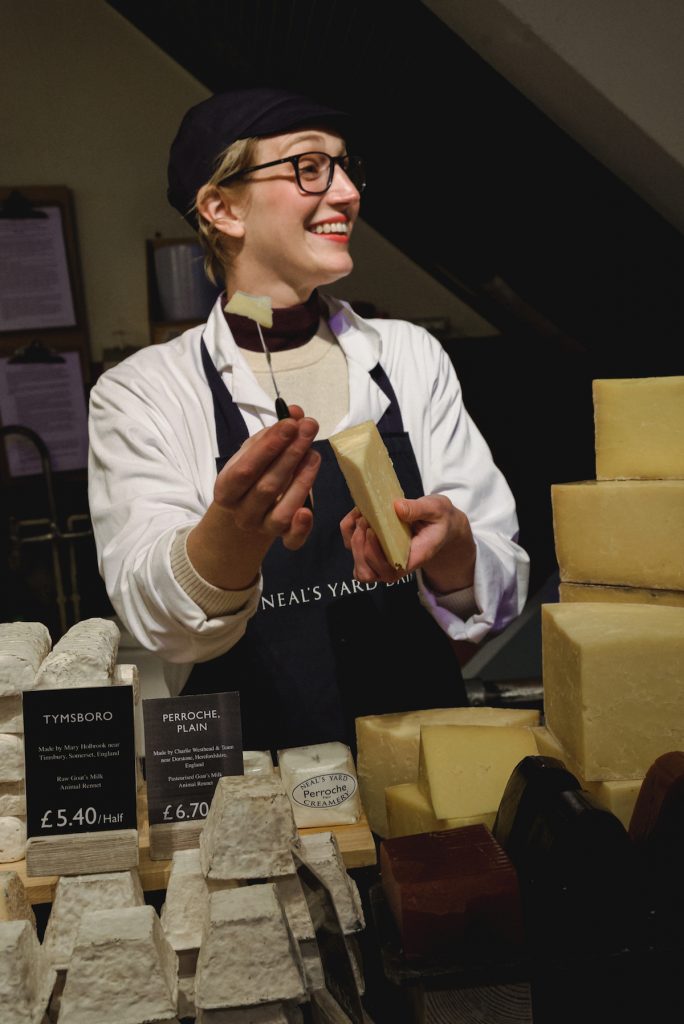
I started cheesemongering when I was in London. To give you the fuller context, I had a video project with the Comté de Cheese Association. I made a series of videos from this specific region in France called the Jura just across from Switzerland. I stayed in the Jura for a week, spending my entire days with the farmers who raised the cows whose milk became Comté. And the cheese makers and affineurs, the people who mature the cheeses on these spruce wood shelves and the cheesemongers. With my video work, I am constantly popping around interviewing people and dipping my toe into a lot of things. But I wanted to immerse my whole foot and then, my whole body. When that week was over and I came home and edited the videos and everything was done, I realized that I was not done.
I was then connected with someone in London and I started cheesemongering.
Palate Party in New York City
I was in the media world in New York and the food completely blew my mind. My palate was having a party every day. There were all of these new things. I realized that there were entire careers in food media and a path for people like me who were really into food. And I started while I was working full time at NBC. I also started interning at a website called Serious Eats. It was then that I wanted to pursue this avenue.
Then when I went freelance, I started my YouTube channel. It’s called QKatie and I post weekly. In the beginning it was just a recipe channel. Of course, it has evolved so much and is now travel heavy.
Attending Le Cordon Bleu
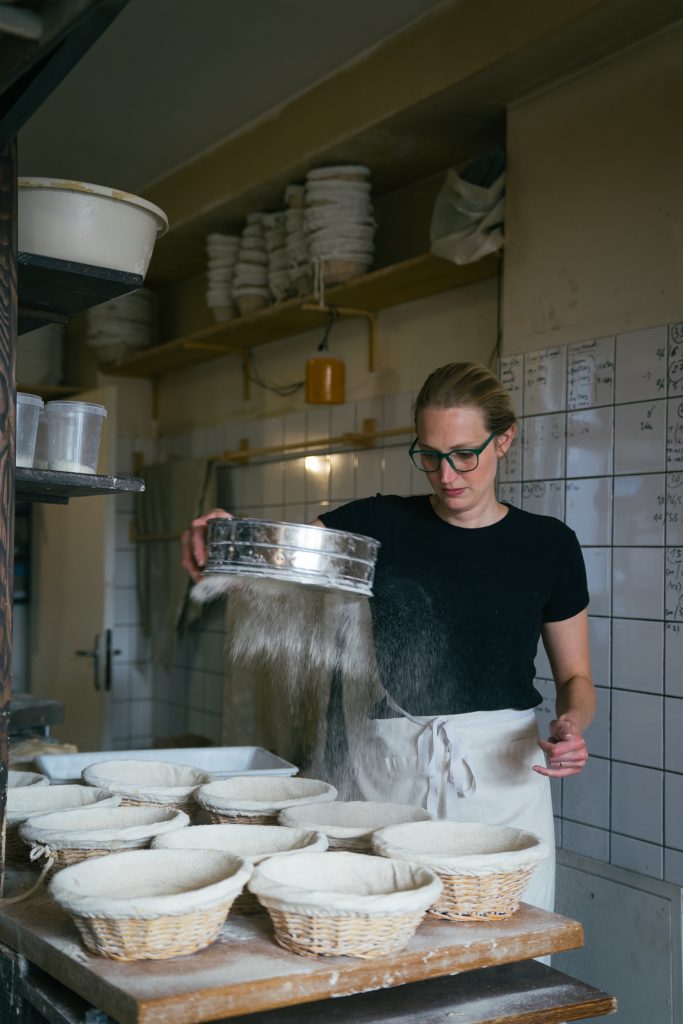
I talk about when I was in France in the book. Going back to the planting the seed metaphor, living in France and going to culinary school helped me understand the importance of bread in French culture. I went to culinary school after starting the YouTube channel and it was becoming my full time thing. People were starting to look at me like I was a food expert. I had big time imposter syndrome and that’s why I decided to do the course at the Cordon Bleu.
It was about five years later that I got the idea about the book.
Finding a Community
As long as I have the internet and my camera, I am able to keep doing what I’m doing. It was though a harder decision than I thought. For anyone who has lived abroad, you know that it’s really exciting. But it’s really hard too. Even in England where it’s the same language, I realized that I didn’t have a community. I missed that. The awesome and beautiful thing about researching, following my curiosity and putting together this book proposal, was that I was accepted into the cheese community. I found my community via the vehicle of cheese.
I could say the same in Italy. The wine community was so welcoming. Finding community through these foods that are so ancient and essential was such a cool experience.
From concept until today, how long did it take to write?
I would say about three and a half years.
The Magic of Fermentation
I didn’t want to get too sciency or nerdy in the book. It’s equally about the people behind the product. For example, the hard decision they have to make to have a business and also maintain the integrity of the product. My travel journey built is also built in there and also recipes throughout the book. It was really like a puzzle.
The process cannot be rushed and neither can fermentation. Time is the main ingredient. Fermentation does not exist without time. Being in digital media like editing, posting and responding to comments – everything moves really fast. The live tweeting culture that some many of us are familiar with, was my entire world. So the main challenge in writing this book and taking on these products that are all about, “let it ferment” was: You can’t rush this!
That was my biggest takeaway. It applies to life!
When I was so impatient with the dual citizenship process here in Italy and before that getting the documents, I would often talk to Connor about if it was even worth it. He was the first to remind me what my book was about and what I learned. It was time and “let it ferment.” And now at the end of that process, I can say that it was worth it. I had to just wait for the “fermentation of bureaucracy”.
The QKatie YouTube Channel
I believe in “keeping it quirky.” I really believe that if we take ourselves too seriously, like what’s the point? We have to keep it quirky because we have to enjoy life. We’re all so unique, weird and interesting. I feel like if we embraced our own quirkiness, everyone would be a lot happier.
A part of it is similar to the fermentation thing. I am a bit of a perfectionist in my work and the slogan ‘keep it quirky’ is a reminder to myself to lighten up.
(33:23) Listen to Katie and Lisa go on a wine tangent, again and about taking the WSET certification course.
Is there a possibility of you produce wine focused videos?
I would love to and because the wines in Italy are so unique by region. There’s so much let’s say, just in this region (Puglia).
Do you really make pizza every Friday?
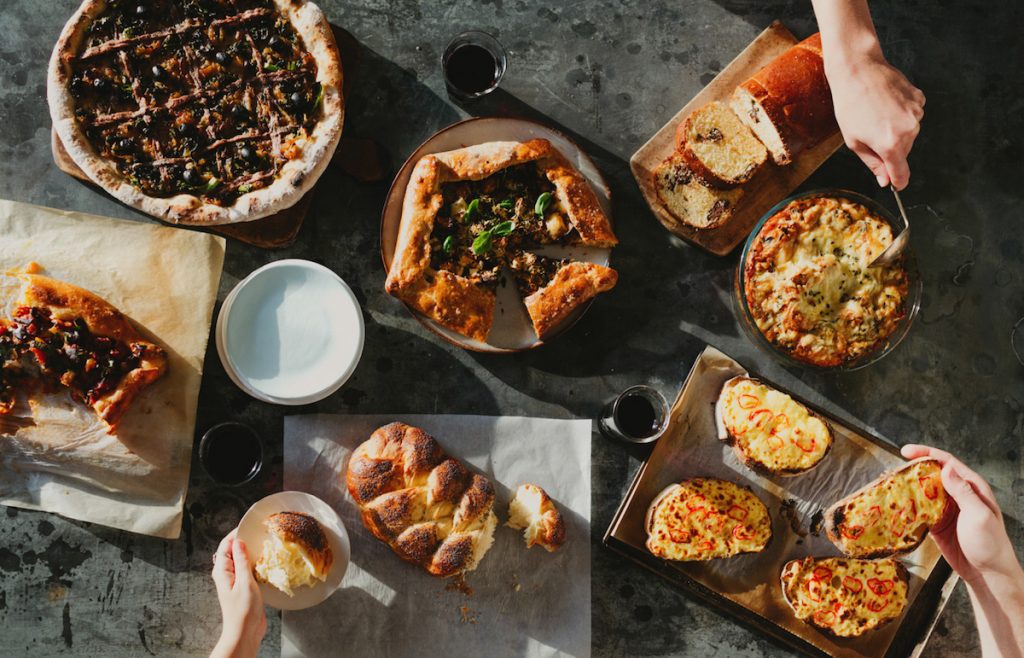
Yes, oh yes! Every single Friday for this entire COVID. I think there may be one or two Fridays that we haven’t had pizza like if we were traveling to another town.
Are you and Connor collaborating on the videos and post-production?
I think it might be changing since we moved to Italy. He is now more hands on as far as ideas. He’s a great wall to bounce things off of. But I do all of the editing and historically, this is my job. I did the videos soup to nuts, completely a one woman band. Since being here and after Connor lost his job because of COVID, it has been really nice to have his input. Also, he’s getting all of these consulting gigs.
For anyone actually moving to Italy and thinking: “how am I going to find a job,” the world is so digital now. Connor and I are both able to work full time from Italy and it has nothing to do with Italian business. It’s fascinating the world that we are living in now.
Living in Italy: Why did you choose Trani?
Trani is right on the Adriatic Sea. I’ve never lived on the water like this before. It is just beautiful. Every day we go for a walk along the port and the coastline. It is stunning. I really have to pinch myself every day. The closest big city to Trani is Bari.
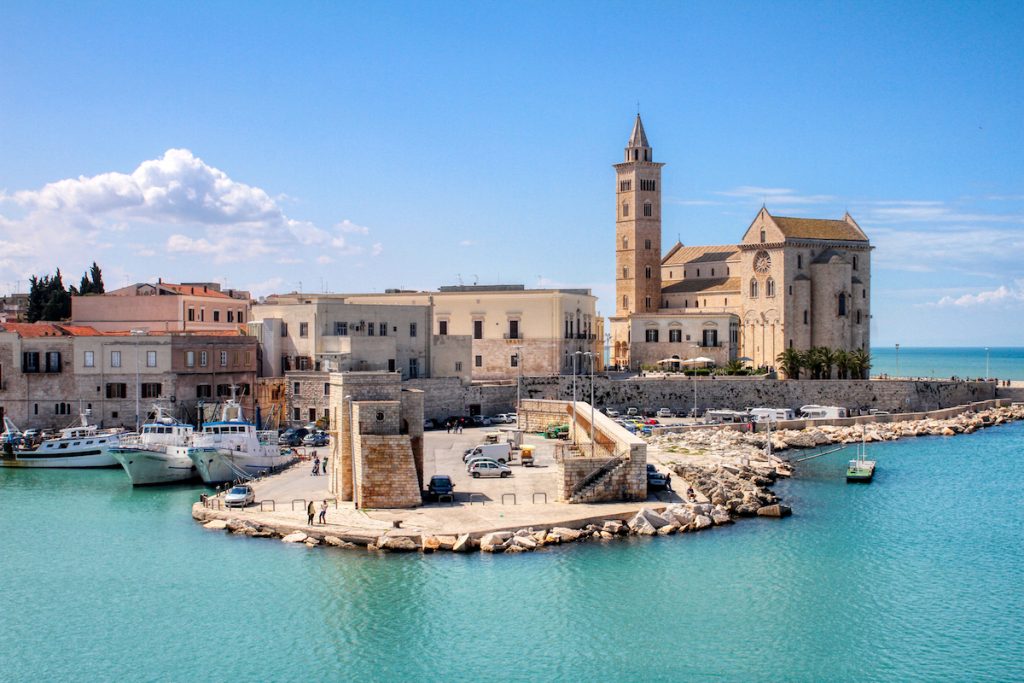
I knew that I wanted to be south and in this general vicinity. My great grandfather was from Basilicata which is right next to Puglia. My great grandmother was from Calabria, also south but more west.
When considering getting dual citizenship in Italy, I was looking for agencies and any kind of help with the process here. I knew that I could not navigate the bureaucracy. The agency that I found said that they were happy to help and they specifically work in the Puglia region. They suggested that I move to Trani. The reason the agency was so specific with that was because, like many things, it’s a lot about the relationships. They had a relationship with commune (city hall) in Trani.
One thing I love about being in a smaller city is that almost no one speaks English. I can’t fall back in terms of language or culturally. It is all about learning and fitting in.
How long did it take to get dual citizenship?
It took three months from once we moved to Italy.
Can you talk about your grandmother and her influence on your life and decisions?
It was such a weird thing to wrap my mind around. The entire reason why I’m here is because of her. My grandmother is the daughter of two Italian immigrants to the States. She is just the best grandmother ever. She passed away just within two days of me achieving citizenship. It felt on one hand horrible. However, at the same time (and a friend pointed this out) it was like grandma went to heaven and pulled some strings. She was so present in that experience and the ceremony. It was like grandma was in the room.
What was food like at home as part of an Italian American family?
Grandma was an amazing cook and I have a few videos with her on the YouTube channel: one of which is her making biscotti. Grandma’s brother and his Italian wife raised their family in a very Italian home. They were proud Italian Americans who had a party every summer. All of the women would be in the garage with fresh tomatoes and canning tomato sauce – a secret recipe. All the men in the family would get together and make hundreds of pounds of pork sausages. They really embraced that culinary side and other cultural elements of being Italian American.
My grandma married a man who descended from England and Scotland and other European countries. She didn’t carry on that life although she herself felt Italian American. But culturally that part of the family was not. We would get together at family reunions and I would see that and actually kind of miss it. I don’t feel that close to my Italian heritage and I think that’s part of the reason why I was so motivated to explore it. It’s like when you’re kind of missing something. It made me more curious.
Has living in a small city been a humbling experience and how have people responded to you?
It is humbling every day. From everything like the language of course and yes, so much vulnerability. We are adults and I am an intelligent adult and you just feel stupid sometimes. But it’s not and it’s understandable. Language is hard and most people understand that and are so very gracious with me.
A smile is universal. Kind eyes and a smile go very far.
The reception here has been really lovely. People have been very kind. I don’t have anything negative to say at all. I think most people are like, “why are you here” and they’re just curious.
Their first question is usually, “ma perché Trani?” I think I give them an appreciation of their city as an outsider. It’s fun to do.
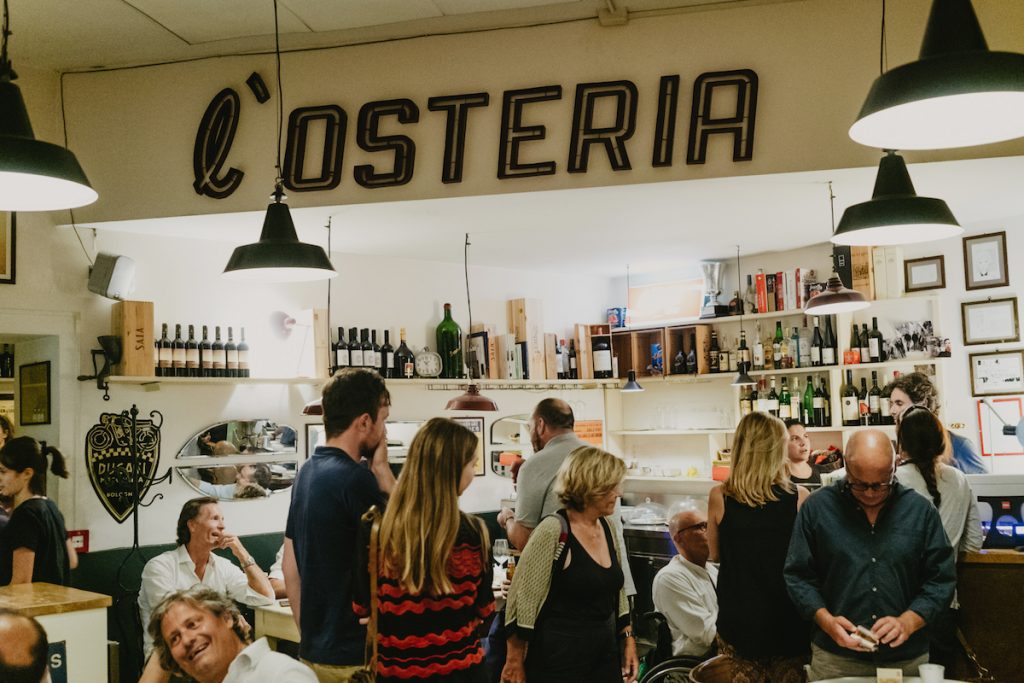
The fact is that we don’t know how long we’ll be here, but it is home for now. We are creating a community here by simply existing and showing up time and again with a smile. People have been so welcoming.
What is your personal definition of an expat?
It kind of reminds me of the wine world that is so full of semantics. It’s just a word, but it’s the meaning that people give to it. I do try to avoid using it because the argument is what’s the difference between an expat and an immigrant? It’s a class and socioeconomic issue and even in some cases, a race issue. I personally use the word foreigner. I’m not from here and even though I now have Italian citizenship. Foreigner and that feels like a neutral word. I am a person constantly learning about this culture and really making a point to understand.
My empathy has been so deepened for that experience because that is also my experience. I feel very grateful for the new way of looking at this whole thing.
What is your favorite place in Italy to travel to and escape?
I visited so many incredible places to write the book, like Catania in Sicily, Mount Etna… This entire country is so diverse especially in terms of food. Anyone who things that Italy is just pizza and pasta has so much more exploration to do. The foods, produce, dishes, cheeses and everything are so specific – like types of pasta, region to region.
I don’t know if I can choose one, but I can tell you where I can’t wait to go. That is some of the other towns in Puglia: Ostuni, Polignano a Mare, Alberobello. They’re really only a few hours’ drive, but because of the constant COVID restrictions, we haven’t been able to see them.
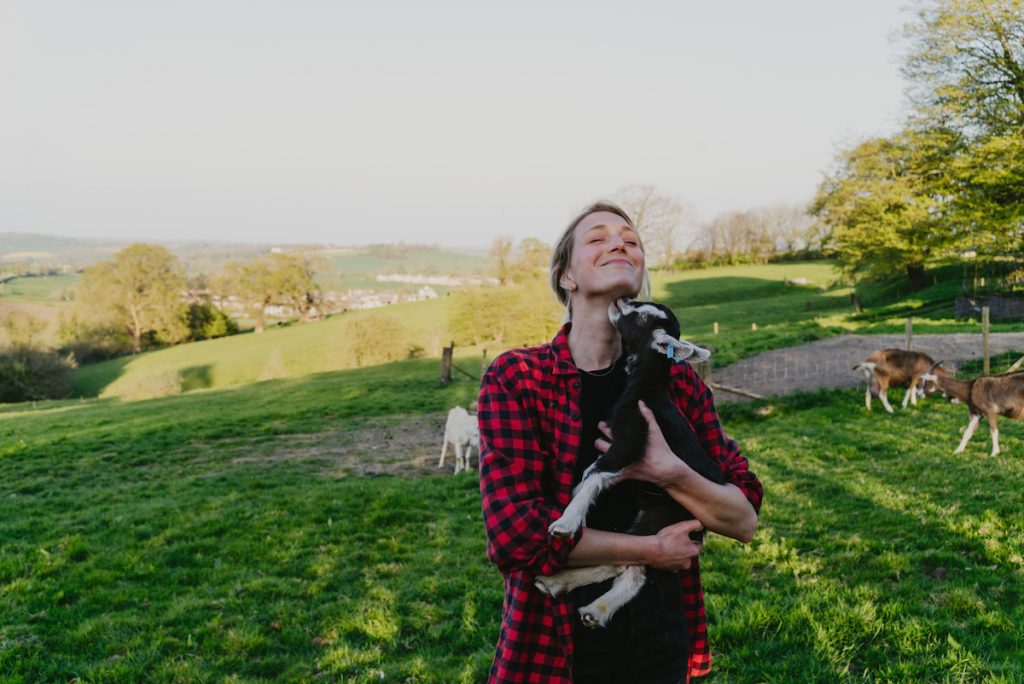
What’s next?
Writing the book was such an incredible experience, but I want to write more. I have more ideas in mind. I’ll keep the YouTube channel going because that’s my bread and butter. It’s the constant of all of these other things that I do, but more books.
If this sells well. So everyone go buy it!
Buy: “Cheese, Wine, Food: The Magic of Fermentation in England, Italy and France”
QKatie YouTube
Instagram
Facebook
Twitter
Podcast
Katie Quinn ‘s Website
Felix Jermann was Born to Be Wild About Wine
A Virtual Vegan Cooking Class
Chat with Sabrina Schench, Director of Trentodoc
Learn the Local Aromas of Rome

